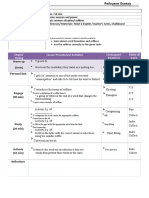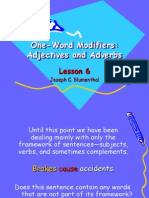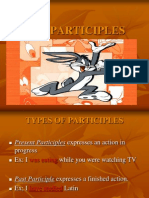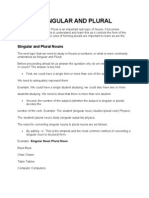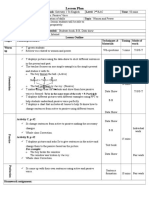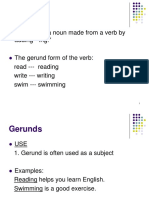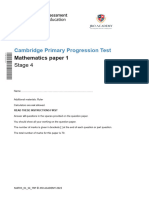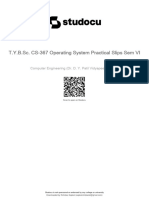0 ratings0% found this document useful (0 votes)
1K viewsForming Nouns and Adjectives
Forming Nouns and Adjectives
Uploaded by
GlenpptThis PPT is useful to help review how prefixes and suffixes are formed with ESL students or native speaker school children.
Copyright:
Attribution Non-Commercial (BY-NC)
Available Formats
Download as PPT, PDF, TXT or read online from Scribd
Forming Nouns and Adjectives
Forming Nouns and Adjectives
Uploaded by
Glenppt0 ratings0% found this document useful (0 votes)
1K views10 pagesThis PPT is useful to help review how prefixes and suffixes are formed with ESL students or native speaker school children.
Copyright
© Attribution Non-Commercial (BY-NC)
Available Formats
PPT, PDF, TXT or read online from Scribd
Share this document
Did you find this document useful?
Is this content inappropriate?
This PPT is useful to help review how prefixes and suffixes are formed with ESL students or native speaker school children.
Copyright:
Attribution Non-Commercial (BY-NC)
Available Formats
Download as PPT, PDF, TXT or read online from Scribd
Download as ppt, pdf, or txt
0 ratings0% found this document useful (0 votes)
1K views10 pagesForming Nouns and Adjectives
Forming Nouns and Adjectives
Uploaded by
GlenpptThis PPT is useful to help review how prefixes and suffixes are formed with ESL students or native speaker school children.
Copyright:
Attribution Non-Commercial (BY-NC)
Available Formats
Download as PPT, PDF, TXT or read online from Scribd
Download as ppt, pdf, or txt
You are on page 1of 10
Forming nouns and adjectives
Let’s explore how we can use prefixes and suffixes to
make new nouns and adjectives…
Glen Persello March 2010
What is a prefix and a suffix?
Groups of letters that make a sound and
are often called syllables.
Prefixes are used at the beginning of
some adjectives, nouns and verbs e.g.
impossible
Suffixes are used at the end of some
nouns and adjectives e.g. beautiful
Verb prefixes un- and dis-
These prefixes have two meanings:
They can have an opposite meaning but
they can also mean the opposite of an
action or to reverse an action e.g.
I locked the door when I left, but then I
lost the key, so I couldn’t unlock it.
The plane appeared in the sky, then
suddenly disappeared behind a cloud.
Some common prefixes…
Prefixes un-, im-, in-, il-, ir- and dis- are
often used to give adjectives and some
verbs/nouns a negative meaning e.g.
happy unhappy possible impossible
like dislike legal illegal
correct incorrect regular irregular
How do we use these prefixes?
un- used with many different words e.g.
unfriendly, unable, unemployed
im- use before some words beginning
with m or p e.g. impolite or impatient
il- use before some words beginning with
l e.g. illegal
How do we use these prefixes?
ir- used only before words beginning with
r e.g. irresponsible
dis-used only before some adjectives e.g.
dishonest and a few verbs e.g. dislike
in- used before a limited number of words
e.g. invisible
Other prefixes with special uses…
re- (again) e.g.
My homework was all wrong, so I had to
redo it.
over- (too much) e.g.
You can get a stomachache from
overeating.
mis- (badly or incorrectly)
I’m sorry, but I misunderstood what you
said
Let’s look at how we make nouns
from verbs using suffixes…
Many nouns are formed by adding a
suffix to a verb.
Verb SuffixNoun
improve -ment improvement
manage -ment management
elect -ion election
discuss -ion discussion
spell -ing spelling
inform -ation information
Let’s look at how we make nouns from
adjectives using suffixes…
Nouns are formed by adding a suffix,
such as –ness or –ity to an adjective.
AdjectiveSuffix Noun
weak -ness weakness
dark -ness darkness
happy -ness happiness
stupid -ity stupidity
punctual -ity punctuality
similar -ity similarity
Other common suffixes…
Here is a list of common noun suffixes
added to nouns or verbs that describe
people and their occupations.
-er -er -or -ist
dancer driver actor artist
singer manager director economist
teacher writer translator psychologist
farmer employer operator journalist
You might also like
- WWII Poster RubricDocument1 pageWWII Poster Rubricsteven_e_kleinNo ratings yet
- 2 Bac Women and Power Vocabulary SuffixesDocument1 page2 Bac Women and Power Vocabulary Suffixesenglish classNo ratings yet
- Forming Nouns and Adjectives Derived From VerbsDocument6 pagesForming Nouns and Adjectives Derived From VerbsBeri DarioNo ratings yet
- Gerunds: Active Passive Simple GERUND Perfect GERUNDDocument2 pagesGerunds: Active Passive Simple GERUND Perfect GERUNDMinja0% (1)
- Mau Lesson PlanDocument6 pagesMau Lesson PlanNgọc SơnNo ratings yet
- Prefixes AND Suffixes: Emmanuel N TufonDocument10 pagesPrefixes AND Suffixes: Emmanuel N TufonEmmanuel TufonNo ratings yet
- Expressing Lack of Understanding and Asking For ClarificationDocument4 pagesExpressing Lack of Understanding and Asking For ClarificationSyairah IbrahimNo ratings yet
- Partner Share: Describe A Movie Where A Toy Comes To LifeDocument21 pagesPartner Share: Describe A Movie Where A Toy Comes To Lifekashifbutty2kNo ratings yet
- ESL Telephone AlphabetDocument1 pageESL Telephone AlphabetRolly Esteban Chin MaldonadoNo ratings yet
- Verbs How Many Could There Be??????: "6 Different Categories of Verbs? That's Crazy!"Document22 pagesVerbs How Many Could There Be??????: "6 Different Categories of Verbs? That's Crazy!"Malik DaniyalNo ratings yet
- Lesson 6 One-Word Modifiers-Ajective AdverbsDocument79 pagesLesson 6 One-Word Modifiers-Ajective AdverbsMayara Nespoli100% (1)
- Using Gerund PhrasesDocument4 pagesUsing Gerund PhrasesSopphia CalopeNo ratings yet
- Comparative and SuperlativeDocument9 pagesComparative and SuperlativeDewi RosianaNo ratings yet
- The Participles 2Document13 pagesThe Participles 2krostinichu100% (1)
- Expressing Regret: Expressing Regret Means Having A Feeling of SadnessDocument9 pagesExpressing Regret: Expressing Regret Means Having A Feeling of SadnessAyoub SABAHNo ratings yet
- 4 AdjectivesDocument19 pages4 Adjectivesapi-252190418No ratings yet
- Chapter 11-Expressing Future Time, Part 2Document26 pagesChapter 11-Expressing Future Time, Part 2noravintelerNo ratings yet
- University of Panama Vicepresidency of Research and Graduate Studies College of Humanities English DepartmentDocument28 pagesUniversity of Panama Vicepresidency of Research and Graduate Studies College of Humanities English DepartmentlingarajugowdaNo ratings yet
- NounsDocument5 pagesNounsMohd ZulfadliNo ratings yet
- Reduced Relative ClausesDocument14 pagesReduced Relative ClausesgamzeNo ratings yet
- Use Examples: Modals in English Grammar 1. CanDocument5 pagesUse Examples: Modals in English Grammar 1. Canangelito peraNo ratings yet
- Grammar. Passive VoiceDocument1 pageGrammar. Passive VoiceHalas MaitNo ratings yet
- Fronting and InversionDocument11 pagesFronting and InversionoaszeusNo ratings yet
- Verbs and Types of Verbs - CompressedDocument58 pagesVerbs and Types of Verbs - CompressedYei CobaNo ratings yet
- First Conditional PresentationDocument14 pagesFirst Conditional PresentationCarmela Etc Astorga-MontalbánNo ratings yet
- Lets Practice How To Write A Paragraph 2 PDFDocument2 pagesLets Practice How To Write A Paragraph 2 PDFLaura Victoria Franco MoraNo ratings yet
- Grammar. Passive VoiceDocument1 pageGrammar. Passive VoiceMed MouminNo ratings yet
- Pronouns and NumeralsDocument14 pagesPronouns and NumeralsIonuţ Nucă100% (1)
- Past Verbs Ending SoundDocument3 pagesPast Verbs Ending SoundJuan Carlos CuevasNo ratings yet
- Ing2b t04 Verbs Grammar ExercisesDocument7 pagesIng2b t04 Verbs Grammar ExercisesRosanna BellaubiNo ratings yet
- Verb Tense Revision ChartDocument2 pagesVerb Tense Revision ChartIrina RațăNo ratings yet
- Gerunds and InfinitivesDocument15 pagesGerunds and InfinitivesMaria Jose SanzNo ratings yet
- WH - Questions: Name: Number/ClassDocument1 pageWH - Questions: Name: Number/ClassDesak RossyanaNo ratings yet
- Transformation of Sentences 2Document11 pagesTransformation of Sentences 2KrishnaBihariShuklaNo ratings yet
- 6.26.-Ed Pronunciation ChartDocument4 pages6.26.-Ed Pronunciation ChartGuilherme DiasNo ratings yet
- Double Negatives: Grade 3Document22 pagesDouble Negatives: Grade 3SelfhelNo ratings yet
- Do and Make Explanation and ExercisesDocument6 pagesDo and Make Explanation and ExercisesWulkymxNo ratings yet
- Meaning & Use: When Do We Use The Tense? We Use TheDocument13 pagesMeaning & Use: When Do We Use The Tense? We Use TheKynnel JuliettNo ratings yet
- Words Stress RulesDocument2 pagesWords Stress RulesjawandhasinghNo ratings yet
- Gerund and InfinitiveDocument33 pagesGerund and InfinitiveꂅᏒꂅภ ᕱᏒᏕᎥภ100% (1)
- Subject-Predicate AgreementDocument3 pagesSubject-Predicate AgreementCorinaNo ratings yet
- Present Perfect - Simple PastDocument16 pagesPresent Perfect - Simple PastLarissi Araujo100% (1)
- NEW Total English: Elementary LevelDocument15 pagesNEW Total English: Elementary LevelEduardo Israel Sanchez Ayala100% (1)
- Verbos Regulares e IrregularesDocument27 pagesVerbos Regulares e IrregularespalNo ratings yet
- Direct and Indirect SpeechDocument8 pagesDirect and Indirect SpeechSuhas Sai MasettyNo ratings yet
- English On Line CourseDocument13 pagesEnglish On Line CourseDaniela Frediani RezendeNo ratings yet
- Oto MOI Grammar 1 Unit 5 - Comparatives - SuperlativesDocument10 pagesOto MOI Grammar 1 Unit 5 - Comparatives - SuperlativesVăn HânNo ratings yet
- Used To/would - Past Habits and StatesDocument2 pagesUsed To/would - Past Habits and StatesTamoo ArcobaneloNo ratings yet
- 1definite and Indefinite Articles PDFDocument5 pages1definite and Indefinite Articles PDFgnomonicoNo ratings yet
- English TensesDocument13 pagesEnglish Tenseslog1alexNo ratings yet
- Modals: Can / Could Might Must ShouldDocument5 pagesModals: Can / Could Might Must ShouldJose Antonio Garcia IvarsNo ratings yet
- The Present Continuous TenseDocument11 pagesThe Present Continuous TenseClau100% (1)
- Unit 29-ArticlesDocument15 pagesUnit 29-Articlesapi-252190418No ratings yet
- General Grammar ReviewDocument7 pagesGeneral Grammar ReviewKimNo ratings yet
- Not Only But Also: InversionDocument6 pagesNot Only But Also: InversionSlobodan Kanza KanovicNo ratings yet
- Adverbsv 3Document13 pagesAdverbsv 3api-252190418No ratings yet
- Time Period Has NOT Finished:: Present Perfect Have Seen This WeekDocument4 pagesTime Period Has NOT Finished:: Present Perfect Have Seen This WeekChoc Sta AnaNo ratings yet
- 2 Bac Humour Grammar ModalsDocument2 pages2 Bac Humour Grammar ModalsKaoutar Jadir100% (1)
- SentencesDocument23 pagesSentencesapi-247557406100% (1)
- Review of Simple and Continuous Tenses Form Uses ExamplesDocument2 pagesReview of Simple and Continuous Tenses Form Uses ExamplesEva Maria ForteaNo ratings yet
- Algo PatternDocument45 pagesAlgo PatternSri Karthik AvalaNo ratings yet
- Jpeg 2000Document15 pagesJpeg 2000Arthinathan SaamNo ratings yet
- Midterm Module For EnglishDocument42 pagesMidterm Module For EnglishMarie ShaneNo ratings yet
- Same GodDocument3 pagesSame GodgraciayverdadcanadaNo ratings yet
- Learning Activity 1 Engineering Sciences and Allied Subjects Physics SourceDocument2 pagesLearning Activity 1 Engineering Sciences and Allied Subjects Physics SourceAraiza FloresNo ratings yet
- DICOM Basic Print SCU Conformance Statement: KODAK PACS Link 9410 Acquisition SystemDocument17 pagesDICOM Basic Print SCU Conformance Statement: KODAK PACS Link 9410 Acquisition SystemAngie Fernanda CarmonaNo ratings yet
- DLL BPPDocument3 pagesDLL BPPFrancez Capuno Sahagun EsquivelNo ratings yet
- Graduation SongsDocument1 pageGraduation SongsDimple LptNo ratings yet
- Gateway SettingsDocument5 pagesGateway SettingsVera WhiteheadNo ratings yet
- Inventory Sheet TemplateDocument5 pagesInventory Sheet TemplateMark Anthony OrasaNo ratings yet
- Cse 322Document2 pagesCse 322Srujan ReddyNo ratings yet
- N4 Computer Practice June 2018Document21 pagesN4 Computer Practice June 2018thulani sibandaNo ratings yet
- Should - Shouldn't - Grupo 2Document14 pagesShould - Shouldn't - Grupo 2jade campos avelinoNo ratings yet
- U5 WorksheetsDocument3 pagesU5 WorksheetsRoberto Jimenez MaciasNo ratings yet
- Project Report ON Online Food Oerdering SystemDocument101 pagesProject Report ON Online Food Oerdering SystemHIMANSHU MISHRA 1847227No ratings yet
- Theory of Mind Development in Deaf Children PowerpointDocument6 pagesTheory of Mind Development in Deaf Children Powerpointapi-283884559No ratings yet
- Detection of Fake and Clone Accounts in Twitter Using Classification and Distance Measure AlgorithmsDocument6 pagesDetection of Fake and Clone Accounts in Twitter Using Classification and Distance Measure AlgorithmsNiranjan CherukuNo ratings yet
- Final Ehqt230337 493Document12 pagesFinal Ehqt230337 493Nguyễn Khắc TâmNo ratings yet
- Bunty Kumavat Objective:: Currently Working With HDFC Bank Ltd. As Assistant Manager (Information Technology)Document11 pagesBunty Kumavat Objective:: Currently Working With HDFC Bank Ltd. As Assistant Manager (Information Technology)muthu sNo ratings yet
- Unit 5: GrammarDocument28 pagesUnit 5: GrammarDRISS BAOUCHENo ratings yet
- De - Experiment 1Document14 pagesDe - Experiment 1harvi.kotadiya121816No ratings yet
- Cultural Evolution of Music PreprintDocument36 pagesCultural Evolution of Music PreprintKhanyisile FakuNo ratings yet
- Data Architecture For SAP HANADocument52 pagesData Architecture For SAP HANASepideh JaliliNo ratings yet
- Stage 4 2023 Cambridge Primary Progression Paper 1 Mathematics JRO AcademhyDocument8 pagesStage 4 2023 Cambridge Primary Progression Paper 1 Mathematics JRO Academhy우리100% (1)
- Tybsc Cs 367 Operating System Practical Slips Sem VIDocument31 pagesTybsc Cs 367 Operating System Practical Slips Sem VIRohidas SapkalNo ratings yet
- Mpu 3022 Chinese Cultural SymbolsDocument10 pagesMpu 3022 Chinese Cultural SymbolsChloeLeeNo ratings yet
- (Lua) Advanced Aerial AI Documentation, Version 4.2 - PastebinDocument5 pages(Lua) Advanced Aerial AI Documentation, Version 4.2 - PastebinLarasmoyo NugrohoNo ratings yet
- Missa Pro Europa 1Document5 pagesMissa Pro Europa 1Ngala FabriceNo ratings yet
- Storytelling Pahang 2 To APKRES 2019Document2 pagesStorytelling Pahang 2 To APKRES 2019bintang shidqiNo ratings yet

